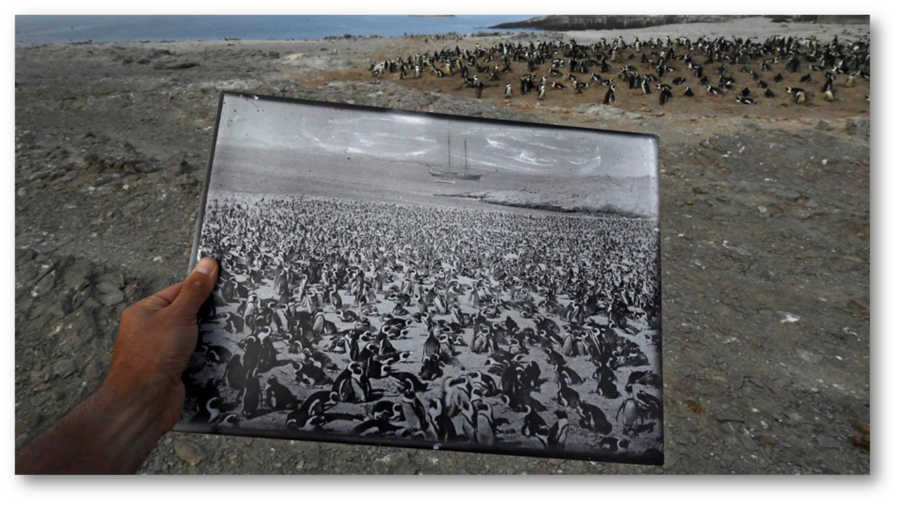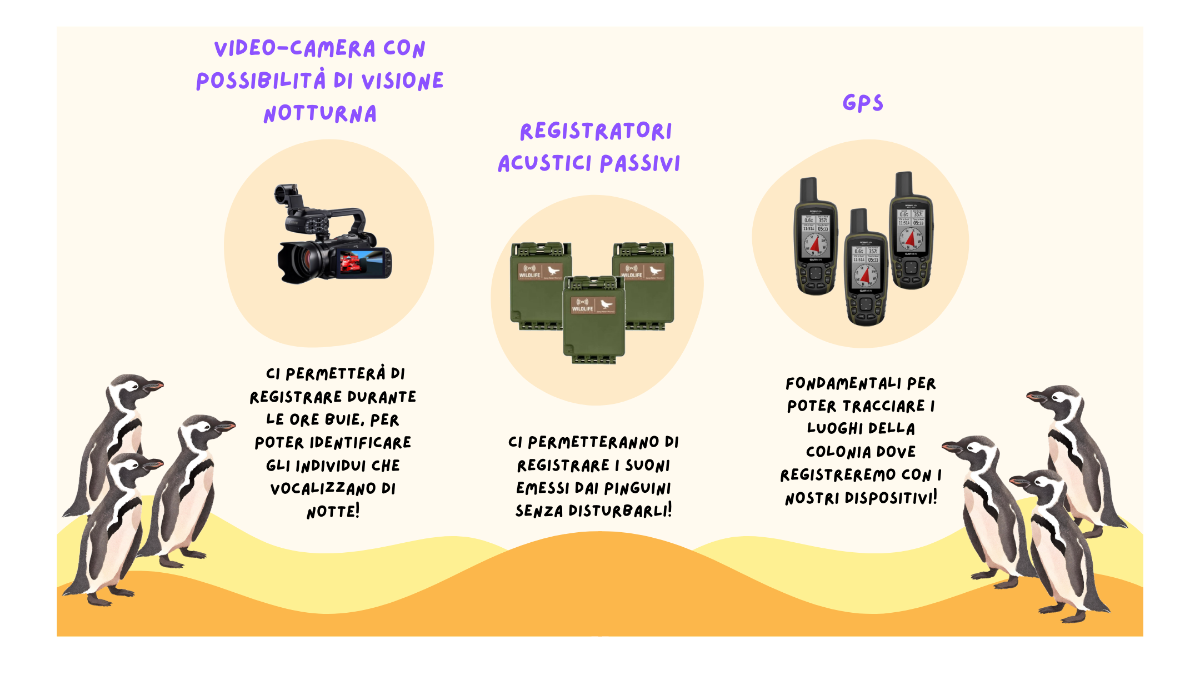

by: African Penguin research UnitO | data 11/12/2023
Have you seen these fascinating animals? WARNING!!! In a few years, all this is destined to be just a memory because the African Penguin is functionally extinct by 2035. Let's change course together! Help us develop a passive acoustic monitoring system for this species!
Despite the African penguin being one of South Africa's most iconic species, of the estimated 1.5 million individuals in 1910, only around 10% remained by the end of the 20th century. The global population has decreased by 98% since the pre-industrial era.

Photo credit: Thomas P. Peschak - Back in Time. A historical photograph of the African penguin colony in the late 1890s, compared to the current situation on Halifax Island, Namibia. The colony once housed over 100,000 penguins.
These numbers have rendered the African penguin a critically endangered species. The primary causes are declining fish stocks, coastal degradation, oil spills, human alterations to natural habitats, and climate change. These combined factors, by reducing and shifting fish shoals, make it difficult for penguins to find food near the coasts, forcing them to swim increasingly greater distances to feed.

Photo credit: BirdLife
African penguins are much smaller than most people think! They don't exceed 60-70 cm in height and 4 kg in weight. They are social and monogamous animals, reproducing once a year at around 4-6 years old in numerous colonies where recognition of partners and chicks occurs through a complex mechanism of visual and vocal communication. To attract their partner (whom they won't change for their whole lives!) and defend the territory from neighboring nests, they emit calls similar to the braying of a donkey, hence being called "Jackass Penguins".
They spend most of their time at sea feeding, using the land only for mating, nesting, and molting. To avoid overheating, these penguins are mainly active at dawn and dusk.
However, their survival is at risk, and we need your help to undertake the journey that will take us to the Stony Point Nature Reserve in South Africa to protect the colony of about 2000 pairs of African penguins that inhabit it. This colony alone hosts almost 10% of all surviving African penguins! There's no time to waste!
Photo credit: Francesca Terranova. African penguin colony in Stony Point Nature Reserve.
We are Livio, Francesca, and Anna from the Marine Biology Laboratory of the Department of Life Sciences and Systems Biology (DBIOS) at the University of Turin. For over 15 years, we have been studying the African penguins of the Stony Point colony in the Betty's Bay region near Cape Town, South Africa. Every year, we and numerous UniTO students visit Stony Point to monitor the colony and collect vital data. This information helps us unveil the complex communication mechanisms these penguins use to manage social relationships within their crowded colonies. Imagine these colonies as true metropolises for penguins, where recognizing each other and defending their territory is fundamental for the survival of every pair. Thanks to these studies, we have discovered many interesting things about their vocal behavior, but most importantly, we've understood how delicate the balance is for their survival!
Have you ever dreamed of venturing among African penguin colonies? Of listening to their communications, witnessing their amusing social interactions? These adorable marine birds are truly special, but unfortunately, human presence represents one of the main threats to their colonies. Our goal is to monitor African penguin populations at Stony Point, intervening as minimally as possible in their lives, allowing them to thrive in peace. To achieve this goal, we have implemented a sophisticated passive acoustic monitoring system. These tools allow us to listen to and record the vocal behavior of penguins without interfering with their daily lives. We can study their vocalizations, monitor the breeding patterns, and assess the population's health, all without causing them any disturbance.
But here's the issue: these technologies are expensive. To keep the acoustic monitoring systems active and continue protecting African penguins, we need your help! Their survival is at stake, and every small contribution makes a difference!
This campaign is an "all or nothing" type: only if we reach the required budget will the campaign succeed, and we'll be able to purchase the equipment necessary to save the penguins!
With your help, we can acquire:

Moreover, if we reach the required budget, the University of Turin will double the funding!
With these additional funds, we can:


Livio is a Zoology and Marine Biology lecturer at the University of Turin and a Research Fellow at the Anton Dohrn Zoological Station in Naples. He focuses on studying and conserving marine birds and mammals through non-invasive acoustic monitoring techniques. His coordinated research projects mainly concentrate in marine protected areas of the Indian Ocean, including South Africa and the Comoros Islands. Nationally, he collaborates with major zoos and aquariums dedicated to conserving endangered marine species. When not in the lecture hall or recording animals... you might still find him on some soccer field in the suburbs! The penguin loses "feathers"... but not the habit!
Francesca, a bioacoustician and ethologist, studies animal sounds (bioacoustics) and their behavior (ethology). She began her research journey studying sounds emitted by dolphins. For the past two years, she has delved into the magical world of African penguins. Her doctoral project focuses on understanding how to utilize the sounds emitted by these small birds in tuxedos to develop passive acoustic monitoring systems and aid in species conservation! Apart from this, she is passionate about music, puzzles, and snorkeling!
Anna, a research technician, specializes in bioacoustics and animal behavior. After studying primates in Madagascar and Ethiopia, she discovered the extraordinary uniqueness of African penguins, to which she is dedicating her current work. Anna is passionate about music and sounds, whether they come from communicating animals or human voices and musical instruments. In fact, when you don't find her in the office analyzing sounds, go look for her under the stage at a great music concert or festival; you'll find her there rejuvenating her mind.

Siamo il team di ricercatori dell'Università di Torino che si occupa dello studio della Bioacustica - studio dei suoni prodotti dagli animali - in particolare dei Pinguini Africani